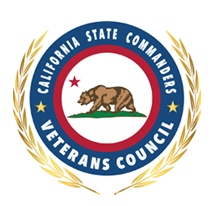Key Issues
The California State Commanders Veterans Council (CSCVC) is comprised of the elected state commanders or representatives from California’s leading veterans service organizations. The CSCVC promotes the rights and benefits of veterans in the State of California, collectively reviews and takes positions on legislation and policies that impact veterans, and shares information with members’ respective organizations on policy matters impacting veterans.
CSCVC’s policy principles help guide the stance the Council takes on policy issues.

Housing
All veterans want and deserve a safe, stable and affordable place to live, whether they are homeowners, renters or facing homelessness. Decades of underproduction has created a severe housing crisis in California, which has driven up prices and made it harder for veterans to find housing. Housing affordability remains a significant concern for veterans, with nearly 35% of veterans paying too much for their housing. CSCVC supports policies that:
- Reduce or Eliminate Property Tax burdens for our California Service-Disabled Veterans rated 100% Permanent and Total to include their surviving dependents.
- Address the root causes of California’s housing supply crisis such as those that encourage construction.
- Increase funding for affordable housing that benefits veterans and their families.
- Encourage the continued availability of rental housing
- Enhance the use of VAC vouchers
- Veteran homelessness is a major concern of CSCVC. According to the US Department of Housing and Urban Development HUD’s 2019 annual Point in Time homeless count, there are roughly 11,000 homeless veterans in California. CSCVC supports policies that:
- Prevent homelessness among veterans and facilitate the rehousing of homeless veterans into transitional and permanent supportive housing
- Enhance access to health and mental health services for homeless veterans
- Elevate awareness about the crisis of veterans’ homelessness
Over 70% of Californian veterans are homeowners who have significant investment in their homes. For many it is their single biggest financial investment they will make in their lives. Retired and senior veterans, in particular, need the financial security associated with their homes. CSCVC supports policies that:
- Promote homeownership among veterans, including lending programs targeted to veterans and policies that increase the supply of housing.
- Keep property taxes affordable
- Maintain property values
- Don’t place unnecessary or costly burdens on property owners
- Increase collaboration between the State of California and Veterans Service Organizations (VSOs) on veteran Stand Down/Stand Up events

Health
Nationwide, veterans experience mental health disorders, substance use disorders, post-traumatic stress and traumatic brain injury at disproportionate rates compared to civilians. Veterans also face the additional challenge of certain health concerns being more prevalent in veterans serving during specific service eras and locations. Veterans get their healthcare from a variety of sources, including the VA, private insurance, and public programs such as Medicare and Medi-Cal. The CSCVC supports policies that:
- Enable health care providers to be prepared for the unique challenges of veterans’ health care by better integrating veteran perspectives into their professional curricula, such as clinical trials, educational courses, etc.
- Improve veterans’ access to healthcare
- Protect VA’s discounted drug pricing
- Expand telehealth services so that veterans in rural and underserved communities have greater access to care
- Reduce the number of veterans and service members who die by suicide each year
- Increase funding and resources to programs that provide for resources, mental health services and prevention programs for veterans at risk of suicide
- Provide funding for research on veteran and service member mental health and traumatic brain injuries
- Addressing toxic exposures from burn pits and burned waste products
- Provide assistance to caregivers of veterans injured in the line of duty including, health coverage, caregiver training, stipends, etc.

Employment
Veterans transitioning out of the service and into civilian careers have many of the skills, qualities and work ethic that employers look for in new hires. However, veterans continue to report the struggles they face while searching for new career opportunities. A survey conducted by Prudential and the IAVA revealed that nearly 70% of veterans struggled transitioning out of the service, with many reporting they were not prepared for the transition, and had difficulties with civilian employees not understanding or appreciating military culture. Pursuing higher education post-service and better equipping servicemembers with the skills they need to better ease into civilian life are important to ensuring long-term success of veterans transitioning out of the service. The CSCVC supports:
- Programs or initiatives that better prepare servicemembers transitioning out of the military and into civilian careers. These may include:
- Expanding the Transition Assistance Program (TAP)
- Establishing programs to provide skill training, employment resources, networking opportunities, etc.
- Helmets to Hardhats construction apprenticeship programs
- Certification programs for translating military experience into civilian careers
- Establishing consistent policies at California institutions of higher education (UC, CSU, community colleges) regarding receiving course credits for military experience
- Improving or expanding G.I. Benefits for veterans and their dependents
- Improved programs, support and loan & grant opportunities for veteran business owners
- Protecting and promoting jobs opportunities for veterans, and supporting industries that employ and/or prioritize the hiring of veterans

Benefits
Many veterans are not aware of how to access the federal and state benefits that are entitled to due to their service and sacrifices for our country. This includes veterans who have recently served as well as veterans from prior eras who may still be eligible for benefits despite the time that has passed since their discharge.
The California Model for Veterans Services (i.e. the processes that connect veterans to benefits and services they have earned) depends on a close partnership between the VA, CalVet, County Veterans Service Offices, and veterans service organizations. Collectively, through claims initiation, development, and representation, these partners provide assistance to veterans and their dependents in preparing and submitting claims and in representing claimants before the federal, state and local agencies providing veterans benefits. Yet despite the good work of these organizations, there continues to be a large number of underserved California veterans and dependents.
The CSCVC supports policies that:
- Support legislation to exclude Veterans Disability Compensation from countable income for purposes of eligibility for benefits and Services from other Government Programs
- Increase funding veterans service organizations and veterans service agencies that provide claims assistance and outreach to California veterans
- Help educate veterans about the benefits they are entitled to receive and the support that exists to help them
- Ensure veteran benefits are always accessible to veterans with honorable discharges, and on a case-by-case basis for those with other than honorable discharges (OTH). The CSCVC recognizes that some veterans received unfair OTH discharges because of discrimination, and believe these veterans should be able to appeal these discharges and gain access to their full benefits. Veterans with bad conduct or dishonorable discharges are not eligible for benefits.

Women Veterans
Currently, women constitute 15% of the active-duty military and 18% of the National Guard and Reserve, and it is projected that 10% of veterans are women. California alone is home to about 145,000 women who served our nation. Despite women’s increased presence in the military, there are still many barriers to accessing health care and other earned benefits. The CSCVC supports policies that:
- Expand access to health care for women veterans, especially in suicide prevention efforts, eating disorder treatment, substance use disorders, and other areas that disproportionately affect female veterans
- Educate women veterans, using targeted outreach, about their earned benefits and what programs they are eligible for
- Increase access to childcare services, especially for those veterans who are in job training programs
- Increase the recognition of female veterans and servicemembers in California

Veteran Recognition
Veterans served our country with distinction and should be recognized for their service and sacrifice. The CSCVC supports causes and legislation that honors and promotes recognition of our servicemembers.

Veterans and Criminal Justice
Justice-involved veterans refers to former service members detained or are under supervision of the criminal justice system. Over 50% of these veterans have mental health issues or substance abuse disorders. Many are homeless or housing insecure, and have difficulties finding employment and transitioning back into civilian life. Veterans face unique challenges and may require extra support or specialized programs to decrease the likelihood of criminal offenses or reoffending. The CSCVC supports policies that:
- Increase the roles of Military Diversion Programs, pretrial programs for veterans charged with misdemeanor crimes
- Support Veteran Treatment Court options, creating structure and support for veterans to fulfil their obligations to the court and prevent reoffending
- Increase veteran criminal sentencing review options for service-related mental health issues
- Increase funding to California Courts specifically for Veterans Treatment Courts and Military Diversion Programs.

Minority Veterans & Underserved Communities
California servicemembers and veterans are an incredibly diverse population, however, have unique challenges that leave minority communities by way of their status often underserved and without adequate support., Minority veterans make up nearly half of the state’s total veteran population, but are historically less likely to access their benefits than non-minority veterans. Native American tribes do not always receive adequate resources for their Veteran community, despite having served in the armed forces at higher rates in proportion to their population than any other ethnic group. For our LGBT veteran populations, California and CalVet have made great strides in increasing access to care and benefits – however, many LGBT veterans do not access their benefits or other support services after years of stigma and fear of reprisal.
The CSCVC supports policies that:
- Improve access to healthcare, benefits, and other services to address health and other disparities among underserved veteran populations.
- Promote more collaboration with tribal governments to ensure Native American veteran access to health and other benefits.
- Address LGBT veteran health disparities by supporting health provider education and inclusive facility policies that increase awareness of LGBT communities’ unique needs and care.
Policy Principles last updated 9.28.2022
